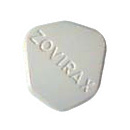Daily
Acyclovir (Zovirax) Delays HIV Disease Progression in People Coinfected with HIV
and Herpes Simplex Virus Type 2
 | The
prevalence of herpes simplex virus type 2 (HSV-2) is high in people with HIV-1.
HSV-2 reactivates frequently and is associated with increased levels of HIV in
plasma and genital secretions. Daily HSV-2 suppressive therapy using acyclovir
(Zovirax) lowers both plasma and genital HIV levels, and also slows CD4 cell decline,
delays the need for antiretroviral therapy, and reduces the rate of death, according
to a study presented at the 5th International AIDS Society Conference on HIV Pathogenesis,
Treatment and Prevention (IAS 2009) in Cape Town last week. |
By
Ronald Baker, PhD Genital
herpes is a sexually transmitted disease (STD) caused by herpes simplex viruses
type 1 (HSV-1) or, more often, type 2 (HSV-2). Genital HSV-2 infection is more
common among women (approximately 1 out of 4) than in men (almost 1 out of 8).
This may be due to male-to-female transmission being more likely than female-to-male
transmission, according to the Centers for Disease Control and Prevention (CDC). 
Results
of short-term studies among HIV positive people coinfected with HSV-2 have shown
that daily suppressive herpes therapy reduces HIV viral load levels. However,
it is not known whether suppression of HSV-2 can slow the progression of HIV disease
over the longer term.  At
last week's conference, researchers reported findings from a randomized, placebo-controlled
trial of HSV-2 suppressive therapy (oral acyclovir 400 mg twice-daily) versus
placebo. At
last week's conference, researchers reported findings from a randomized, placebo-controlled
trial of HSV-2 suppressive therapy (oral acyclovir 400 mg twice-daily) versus
placebo.
The
study included 3381 participants in Africa (2284 women and 1097 men) coinfected
with HIV-1 and HSV-2 who had relatively well-preserved immune function, with a
CD4 count > 250 cells/mm3, and were not taking antiretroviral therapy
(ART). Participants
were followed for about 24 months. The primary outcome measure was first occurrence
of a CD4 count < 200 cells/mm3, start of ART, or death from non-trauma causes.
Results  | Acyclovir
reduced the risk of HIV disease progression. |  | 284
patients in the acyclovir arm versus 325 in the placebo arm reached the composite
primary endpoint (P=0.03). |  | Among
participants with CD4 counts > 350 cells/mm3 at enrollment, acyclovir
delayed the time to reach < 350 cells/mm3 (P=0.002). |  | Calculations
demonstrated that 43 individuals would need to receive acyclovir for a year to
prevent 1 composite endpoint event. |  | 20
people would need to be treated to prevent 1 person from progressing to a CD4
count < 350 cells/mm3. |
The
researchers concluded, "Suppression of HSV-2 with daily acyclovir reduced
the rate of a composite of CD4 decline, need for ART, and mortality among African
women and men dually-infected with HSV-2 and HIV-1 and CD4 >250 at enrollment."
They added, "Further evaluation is needed to determine if this 17% reduction
in risk of HIV-1 disease progression is sufficient to warrant implementation of
HSV-2 suppression as a public health intervention for HIV-1 infected adults not
yet requiring ART." 7/28/09 Reference
JR
Lingappa, JM Baeten, A. Wald, and others (for the Partners in Prevention HSV/HIV).
Daily acyclovir delays HIV-1 disease progression among HIV-1/HSV-2 dually-infected
persons: a randomized trial. 5th International AIDS Society Conference on HIV
Pathogenesis, Treatment, and Prevention (IAS 2009). Cape Town, South Africa. July
19-22, 2009. Abstract WeLBC102. (Abstract).
|
|